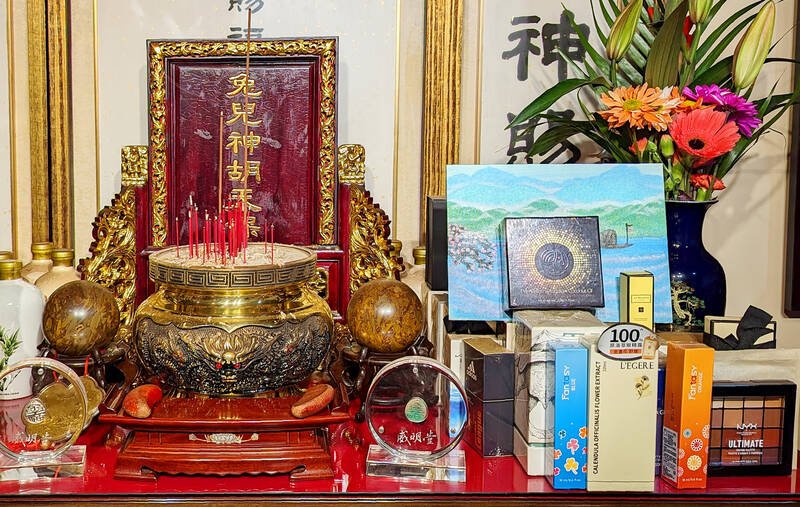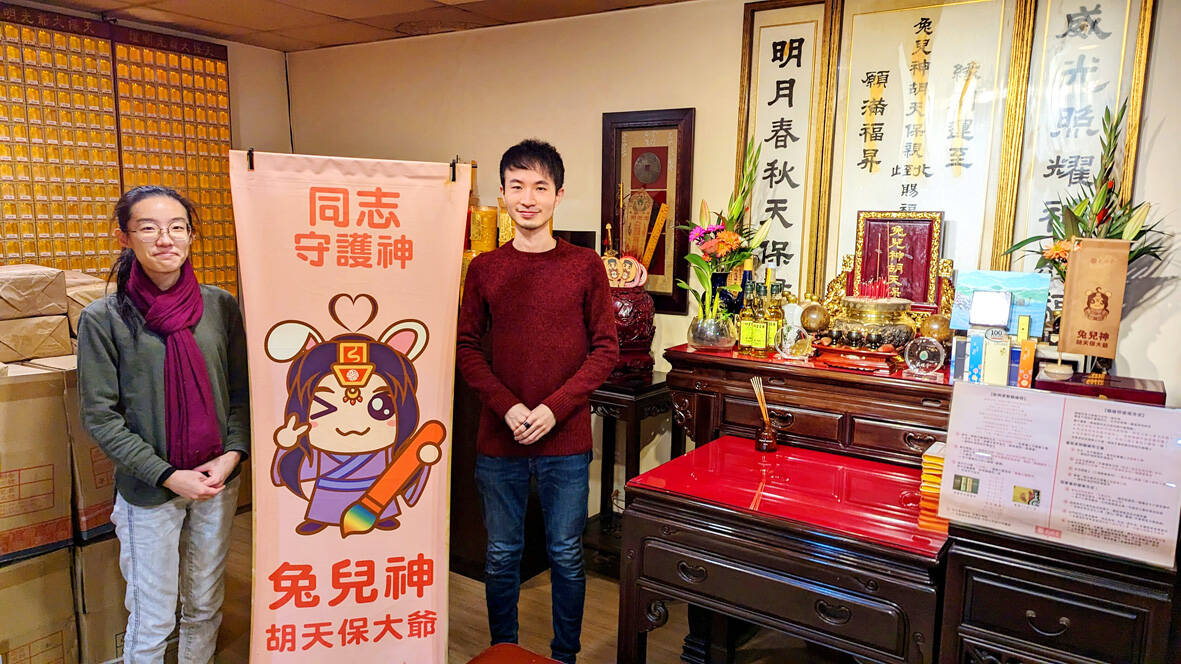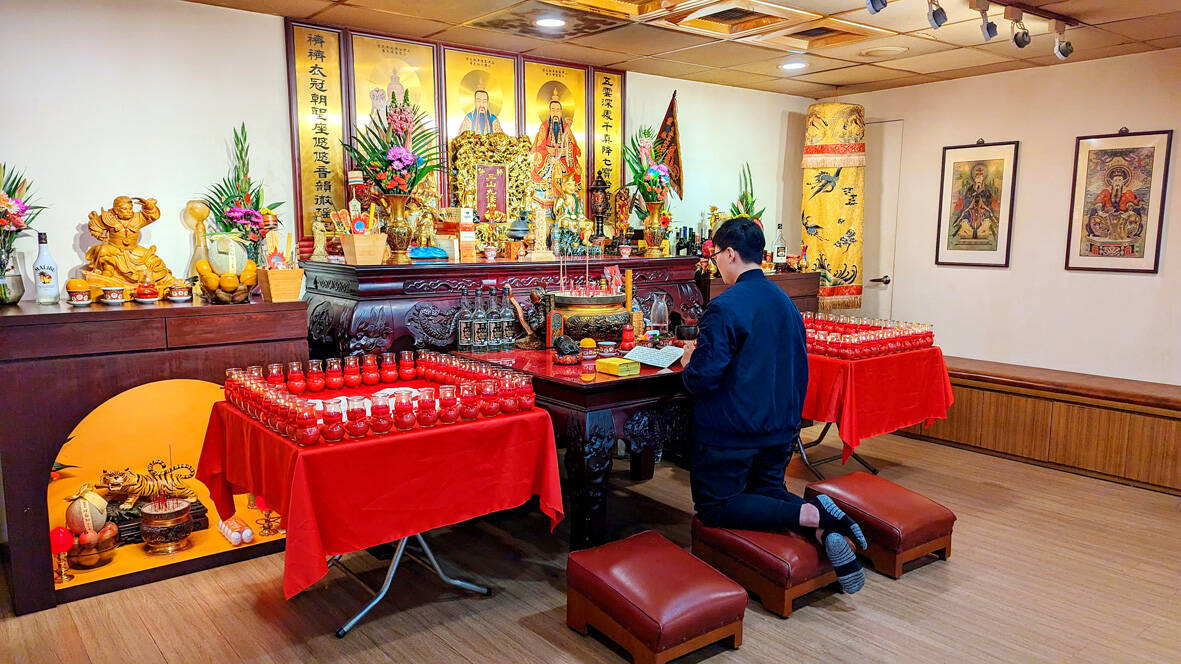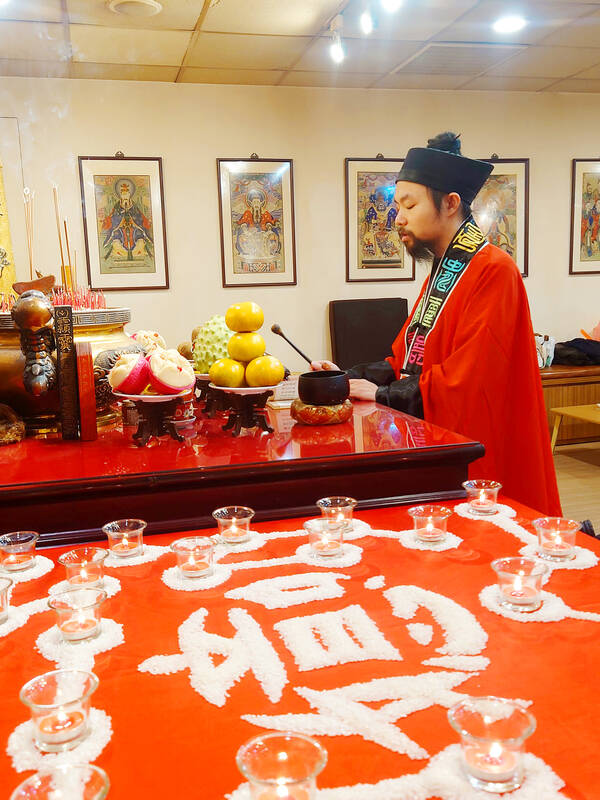Struggling with his feelings toward a male classmate, Hsiao-an (小安) visited the Rabbit God (兔兒神) at Weiming Temple (威明堂) last month.
“I couldn’t really accept it. I was upset for a whole year, and I could barely study. But I figured that if I really liked men, and there is such a deity for it, I might as well check it out,” the university student, who prefers not to reveal his real name, tells the Taipei Times.
The Rabbit God, whom worshippers call Ta Yeh (大爺), is the gay counterpart to Yueh Lao (月老, Old Man Under the Moon), a popular deity responsible for love and marriage. Today, Weiming Temple is the only place in the world that worships the Rabbit God. Visitors have nine tries to throw divination blocks and obtain a love charm from the deity, and Hsiao-an got it on his fourth attempt.

Photo: Han Cheung, Taipei Times
He returned several times, eventually meeting temple founder Lu Wei-ming (盧威明), who gave him advice on how to deal with his inner conflict and provided him with some Taoist scriptures to recite. Still waiting for school to start, Hsiao-an plans to spend his Friday afternoon reciting them in the shrine’s main hall, located on the 8th floor of a high-rise in New Taipei City’s Chungho District (中和).
“I was sure that [my love interest] was hetero and my feelings were a huge mistake, but Master Lu said that wasn’t necessarily the case,” Hsiao-an says.
Weiming Temple hasn’t seen an explosion of visitors due to it being the Year of the Rabbit, as other animal temples often do.

Photo: Han Cheung, Taipei Times
“It’s because Ta Yeh isn’t actually a rabbit,” long time follower Chang Hsi-wei (張席維) says. “The designation comes from ‘rabbit’ as a historic slur for homosexuals. However, more people have been searching online for the term ‘rabbit’ due to the new year and accidentally come across our temple.”
NOT A RABBIT
Even though commonly called the Rabbit God Temple, Weiming Temple’s main deity is the Nine Marquesses of the Three Mountains (三山九侯). It started as a private shrine in 2007 before moving to its current location in 2016. The elevator doors first open to a Christian church, and the temple and adjacent Taoist learning center is down the hall.

Photo: Han Cheung, Taipei Times
Chang says that relations with the church were quite good at first, but things took a turn after the arrival of a new pastor, who refused to share bathrooms with the temple. So each group claimed one of the men’s and women’s rooms on the floor.
“The funny thing is that now their restroom is ‘gender friendly’ since they all use the same one,” Chang quips.
I’m supposed to meet Lu at 1:03pm, but unfortunately he can’t make it due to an emergency with a follower. So I speak to Chang, who has been with the temple since its inception. Lu’s story and the legend of the Rabbit God is covered in detail in the Taipei Times article “Taoist homosexuals turn to the Rabbit God” (Oct. 21, 2007).

Photo courtesy of Weiming Temple
The Rabbit God is based on 18th-century Chinese official Hu Tianbao (胡天保), who was beaten to death after he was caught peeping at a local inspector he had feelings for through a bathroom wall. Soon after his death, Hu appeared in the dream of a local man, telling him that the lord of the underworld had appointed him the Rabbit God to govern the affairs of the gay community. He asked the man to erect a shrine for him, and his influence spread.
There is little rabbit imagery to distinguish the altar from any other shrine. What stands out are the perfume, skincare and beauty products offered to the deity. Since he was once a human, the Rabbit God does not like being treated as a rabbit. Once, a group of worshippers from Taichung brought carrots as their offerings, and the Rabbit God was allegedly so upset that none of them succeeded in receiving love charms.
Chang says the temple does have a few cartoon depictions of the Rabbit God in human form with rabbit ears, but that’s a compromise they’ve made for promotional purposes.
LGBTQ ROMANCE
Chang says he received help from Lu when the latter was just starting out as a Taoist priest. When Lu started the Weiming Temple after noticing the lack of temples that serviced the gay community, Chang, who is gay, decided to help him and became one of his earliest disciples.
“We’ve had worshippers come here because they were rejected by their family’s temple due to their sexuality,” Chang says.
Chang says that although theoretically, Taoism does not discriminate against LGBTQ people, they have faced criticism and exclusion from other temples in the past. The yin-yang symbol, for example, has a drop of yang in the yin part and vice versa, and it’s natural to have fluidity between the two energies. While there are gender-specific Taoist rituals, such as men and women standing on different sides during ceremonies, Chang says participants here can choose whichever side they identify with.
Meanwhile, temples in Taiwan have become more inclusive in the past 15 years. In 2015, for example, Taipei’s Xia Hai City God Temple (霞海城隍廟) clarified that homosexuals can also find luck in romance through its popular Yueh Lao.
Chang says that since Yueh Lao traditionally serves heterosexual people, some gay men who pray there may end up meeting a lot of new female friends instead. But there are also those who have found success with Yueh Lao. And some say they were told to come to Weiming Temple by Yueh Lao.
“The people running the temples may adapt their beliefs, but the gods still have their specific duties,” Chang says.
Chang says before the legalization of same-sex marriage, they would see gay couples visiting together. This is not as common for heterosexuals, he says. Fellow disciple Dean Yang (楊定哲) says it’s because same-sex couples often felt insecure because of the uncertainty of not being able to get married. Nowadays, many come to wish for marriage.
“After legalization, a couple who met through Ta Yeh’s arrangement returned to fulfill their vows,” Yang says. “That made us very happy.”
TAOIST LEARNING
However, the temple isn’t just about romance, as the Rabbit God is only a secondary deity. They observe regular Taoist events, and anyone is welcome, Chang says.
Lu emphasizes the teaching of orthodox Taoist principles and beliefs, noting that most people nowadays only visit temples to pray instead of actually following Taoism as a religion.
“You wouldn’t visit a church, pray to Jesus and just leave,” Chang says. “You listen to the pastor talk about what sort of behavior pleases God.”
The temple’s disciples have increased in the past decade, and Agnes Chen (陳宣穎) is one of the few non-LGBTQ worshippers. She was having trouble with her parents, and her friend, who is a regular, invited her along two years ago.
“A lot of people come here initially for romance issues, but all of our problems, if you delve deep enough, have similar roots,” she says. “Studying the Tao is cultivating the mind, regardless of sexual orientation.”
Yang first visited during his university days, when he wasn’t sure whether to pursue a classmate romantically or not. He returned many years later after hitting a snag in his relationship.
“Lu pointed out the root of my problem, whether it was related to my personality or to my karma, and told me what areas I needed to work on,” he says. “Over time, my personality got better, and then my love life did too.”

Taiwan has next to no political engagement in Myanmar, either with the ruling military junta nor the dozens of armed groups who’ve in the last five years taken over around two-thirds of the nation’s territory in a sprawling, patchwork civil war. But early last month, the leader of one relatively minor Burmese revolutionary faction, General Nerdah Bomya, who is also an alleged war criminal, made a low key visit to Taipei, where he met with a member of President William Lai’s (賴清德) staff, a retired Taiwanese military official and several academics. “I feel like Taiwan is a good example of

March 2 to March 8 Gunfire rang out along the shore of the frontline island of Lieyu (烈嶼) on a foggy afternoon on March 7, 1987. By the time it was over, about 20 unarmed Vietnamese refugees — men, women, elderly and children — were dead. They were hastily buried, followed by decades of silence. Months later, opposition politicians and journalists tried to uncover what had happened, but conflicting accounts only deepened the confusion. One version suggested that government troops had mistakenly killed their own operatives attempting to return home from Vietnam. The military maintained that the

Before the last section of the round-the-island railway was electrified, one old blue train still chugged back and forth between Pingtung County’s Fangliao (枋寮) and Taitung (台東) stations once a day. It was so slow, was so hot (it had no air conditioning) and covered such a short distance, that the low fare still failed to attract many riders. This relic of the past was finally retired when the South Link Line was fully electrified on Dec. 23, 2020. A wave of nostalgia surrounded the termination of the Ordinary Train service, as these train carriages had been in use for decades

Lori Sepich smoked for years and sometimes skipped taking her blood pressure medicine. But she never thought she’d have a heart attack. The possibility “just wasn’t registering with me,” said the 64-year-old from Memphis, Tennessee, who suffered two of them 13 years apart. She’s far from alone. More than 60 million women in the US live with cardiovascular disease, which includes heart disease as well as stroke, heart failure and atrial fibrillation. And despite the myth that heart attacks mostly strike men, women are vulnerable too. Overall in the US, 1 in 5 women dies of cardiovascular disease each year, 37,000 of them